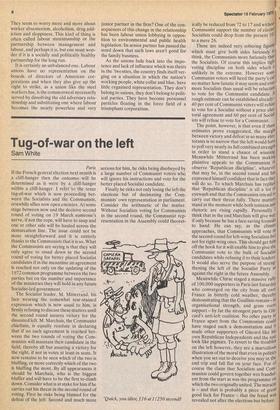Tug-of-war on the left
Sam White
Pads
If the French general election next month is a cliff-hanger then the outcome will be determined as it were by a cliff-hanger within a cliff-hanger. I refer to the tense tug-of-war which is now proceeding between the Socialists and the Communists, erstwhile allies now open enemies. At some stage between now and the decisive second round of voting on 19 March someone's nerve, if not the rope, will have to snap and one or other side will be hauled across the demarcation line. The issue could not be more straightforward and it is entirely thanks to the Communists that it is so. What the Communists are saying is that they will only agree to stand down in the second round of voting for better placed Socialist candidates if in the meantime an agreement is reached not only on the updating of the 1972 common programme between the two parties but on the number and importance of the ministries they will hold in any future Socialist-led government.
The Socialist leader, M. Mitterrand, his face wearing the somewhat tear-stained expression which is now usual to him, is firmly refusing to discuss these matters until the second round assures victory for the disunited left. M. Marchais, the Communist chieftain, is equally resolute in declaring that if no such agreement is reached between the two rounds of voting the Communists will maintain their candidate in the field, thereby all but assuring a victory for the right, if not in votes at least in seats. It now remains to be seen which of the two is bluffing, or more correctly which of the two is bluffing the most. By all appearances it should be Marchais, who is the biggest bluffer and will have to be the first to climb down. Consider what is at stake for him if he carries out his threat in the second round of voting. First he risks being blamed for the defeat of the left. Second and much more serious for him, he risks being disobeyed by a large number of Communist voters who will ignore his instructions and vote for the better placed Socialist candidate.
Finally he risks not only losing the left the elections but of decimating the Communists' own representation in parliament. Consider the arithmetic of the matter. Without Socialists voting for Communists in the second round, the Communist representation in the Assembly could theoret
ically be reduced from 72 to 17 and without Communist support the number of elected, Socialists could drop from the present 10* to a mere 26.
These are indeed very sobering figure which must give both sides furiously te think, the Communists more furiously than the Socialists. Of course this implies tight voting discipline on both sides which Is unlikely in the extreme. However sonic Communist voters will heed the party's call no matter how lunatic it may seem and even more Socialists than usual will be reluctant to vote for the Communist candidate. A rough estimate can be established already' 40 per cent of Communist voters will refuse to vote for a Socialist without a prior elee toral agreement and 60 per cent of Social' ists will refuse to vote for a Communist.
The point, however, is that even if these estimates prove exaggerated, the margin between victory and defeat in so many elee torates is so narrow that the left would have to poll very nearly its full combined strength in order to stand a chance of winning. Meanwhile Mitterrand has been making plaintive appeals to the Communists to observe 'Republican discipline', whatever that may be, in the second round and has expressed himself confident that in fact the) will do so. To which Marchais has replied that 'Republican discipline' is all a lot of eyewash and that the Communists intend te carry out their threat fully. There matters stand at the moment while both tension ad I rhetoric are rising rapidly. Personally think that in the end Marchais will give waY if only because he has a face-saving formula to hand. He can say, as the climes approaches, that Communists will vote le the second round for left-wing Socialists bat not for right-wing ones. This should get hilt) off the hook for it will enable him to give the Communist vote to the bulk of Socialist candidates while refusing it to their leaders. It would also serve the purpose of streng' thening the left of the Socialist Party as against the right in the future Assembly. Meanwhile Chirac staged a massive rallY of 100,000 supporters in Paris last SaturdaY who converged on the city from all over France in bitterly cold weather, therebY demonstrating that the Gaullists remain —le organisational strength, and grass roots support — by far the strongest party in Giscard's anti-left coalition. No other party 01, France apart from the Communists could have staged such a demonstration and lt made other supporters of Giscard like his own Republican Independents and the rest look like pigmies. To revert to the troubles on the left however, they are a marvellous illustration of the moral that even in politics when you set out to deceive you may in the end trip and fall flat on your face. For of course the claim that Socialists and Cora' munists could govern together was fraudul" ent from the start as was the programme 011 which the two originally united. The miracle is — and that is probably a piece of great good luck for France — that the fraud was revealed not after the elections but before.


































 Previous page
Previous page